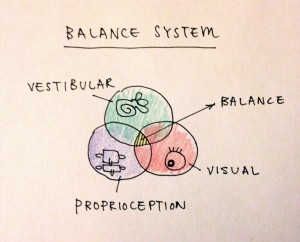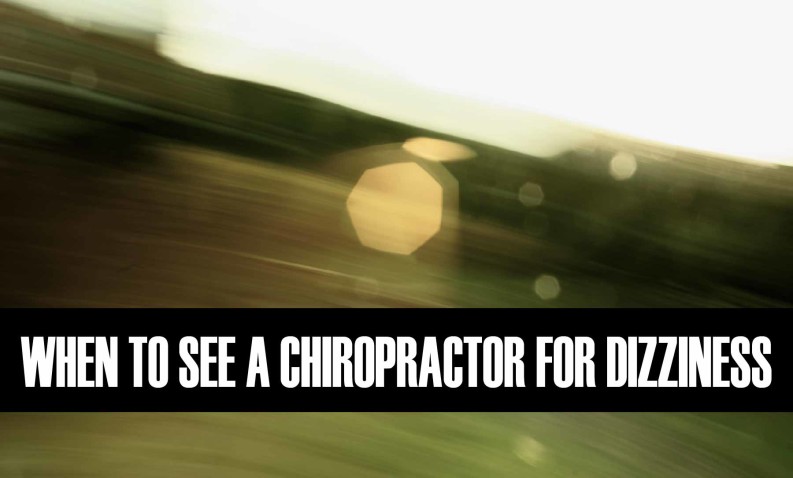Chiropractic certainly has its time and place in the management of vertigo, but is rarely the first option that comes to mind for most people. As a result, most of my patients with dizziness come to me when they had exhausted other options.
Dizziness is a complex phenomenon that often has more than one cause. (1) Neck pain related dizziness is often ignored, because, to date, nobody can agree on its diagnostic criteria, and there is no specific lab test for it. (2) Also, it doesn’t explain why some people with really bad neck pain don’t have dizziness, while others with moderate neck pain do.
How Does A Neck Problem Cause Dizziness?
 There are three systems that contribute to our sense of balance—vision, vestibular system (sensors in our inner ears), and proprioception (sensory from joints and muscles).
There are three systems that contribute to our sense of balance—vision, vestibular system (sensors in our inner ears), and proprioception (sensory from joints and muscles).
- Proprioceptive disruption: There is more sensory input to the brain from the neck than any other spinal joints. It is reasonable to say that a disruption in this system can disrupt a person’s sense of balance. A study has confirmed that whiplash injury causes joint position errors in the neck, which is likely the cause of dizziness. (3)
- Sympathetic dysfunction: This theory was abandoned until recent years. Scientists found that degeneration of the disc can compress a ligament in the neck and trigger sympathetic responses, such as vertigo, ringing in the ear, nausea, vomiting, and digestive issues. (4)
- Blood Flow Disruption: Although this rarely happens, degeneration of cervical spine can temporarily cut off blood flow to the brain when turning one’s neck and cause dizziness. (5,6)
When Do I see A Chiropractor For My Dizziness?
Not all dizziness can be managed by conservative care. If a chiropractor is your first point of contact, with a thorough clinical exam, a well-trained chiropractor is able to identify the cause of dizziness in most cases and make proper referral if needed. Studies show that expensive diagnostics are rarely helpful in dizzy elderly people. (7)
If you have been to multiple doctors and specialists, and all your testing seems to come back normal, a problem in your neck maybe a contributor to your symptoms. Remember, there is no specific lab test for it, so many doctors don’t consider the possibility. However, studies clearly show an association between neck problem and dizziness. In this case, manual therapy, conservative treatment and vestibular rehabilitation are your best options. (2)
References:
- http://www.ncbi.nlm.nih.gov/pmc/articles/PMC2352174/
- http://www.ncbi.nlm.nih.gov/pubmed/26218949
- http://www.ncbi.nlm.nih.gov/pubmed/12610847
- http://www.ncbi.nlm.nih.gov/pubmed/25550947
- http://www.ncbi.nlm.nih.gov/pubmed/19663339
- http://www.ncbi.nlm.nih.gov/pubmed/16720191
- http://www.ncbi.nlm.nih.gov/pubmed/8842072
About the Author
Dr. Lily Semrow is a Board Certified Chiropractic Neurologist who focuses on Neuro-Structural Correction. She has a B.S. in Nutrition and a doctorate in Chiropractic. She has a passion for serving families, and helping people who could not get better through traditional and alternative means.


Comments 2
My husband has been experiencing vertigo for a while now and none of the doctors come back with a conclusive reason. So thanks for letting us know that if all the tests seem normal, it is probably caused by neck pain. I’ll be sure that we get him into a chiropractor soon so that he can get some vertigo rehab as soon as possible.
Author
Hello Ashley, glad this article mentions an option you and your husband have not explored. Make sure to look for a board certified chiropractic neurologist. Most chiropractors don’t do vestibular rehab.